- Home
- Julie Smith
P.I. On A Hot Tin Roof
P.I. On A Hot Tin Roof Read online
PRAISE for P.I. on a Hot Ton Roof, the FOURTH book in the Talba Wallis series:
“This spicy gumbo of steamy mystery, saucy humor and piquant social commentary should appeal to discriminating crime fans.”
—Publishers Weekly
“…the fun, frenetic pace of a typical Talba Wallis caper. This is an effective mix of household drama, political corruption, and old-style murder mystery”
—Booklist
“If you haven’t read Smith before, this is the time to start. If you’re a fan, you’re in for yet another treat.”
—Marcia Muller, bestselling author of Dead Midnight
“(Talba) Wallis is fine fun to get to know… a consistently interesting and likable woman of depth and complexity.”
—The Washington Post on Louisiana Bigshot
The Talba Wallis Series
LOUISIANA HOTSHOT
LOUISIANA BIGSHOT
LOUISIANA LAMENT
P.I. ON A HOT TIN ROOF
Also by Julie Smith:
The Skip Langdon Series
NEW ORLEANS MOURNING
THE AXEMAN’S JAZZ
JAZZ FUNERAL
DEATH BEFORE FACEBOOK
(formerly NEW ORLEANS BEAT)
HOUSE OF BLUES
THE KINDNESS OF STRANGERS
CRESCENT CITY CONNECTION
(formerly CRESCENT CITY KILL)
82 DESIRE
MEAN WOMAN BLUES
The Rebecca Schwartz Series
DEATH TURNS A TRICK
THE SOURDOUGH WARS
TOURIST TRAP
DEAD IN THE WATER
OTHER PEOPLE’S SKELETONS
The Paul Mcdonald Series
TRUE-LIFE ADVENTURE
HUCKLEBERRY FIEND
As Well As
WRITING YOUR WAY: THE GREAT AMERICAN NOVEL TRACK
NEW ORLEANS NOIR (ed.)
To learn more check out
www.juliesmithauthor.com
www.booksbnimble.com
P.I. on a Hot Tin Roof
The Talba Wallis Series
By
JULIE SMITH
booksBnimble Publishing
New Orleans, La.
P.I. on a Hot Tin Roof
Copyright 2005 by Julie Smith
Cover by Nevada Barr
ISBN: 9781617504488
Originally published by Forge Book, published by Tom Doherty Associates, LLC, 175 Fifth Avenue, New York, NY 10010. www.tor.com
www.booksbnimble.com
All rights are reserved. No part of this book may be used or reproduced in any manner whatsoever without written permission, except in the case of brief quotations embodied in critical articles and reviews.
First booksBnimble Publishing electronic publication: January 2013
eBook editions by eBooks by Barb for booknook.biz
Contents
Chapter 1 • Chapter 2
Chapter 3 • Chapter 4
Chapter 5 • Chapter 6
Chapter 7 • Chapter 8
Chapter 9 • Chapter 10
Chapter 11 • Chapter 12
Chapter 13 • Chapter 14
Chapter 15 • Chapter 16
Chapter 17 • Chapter 18
Chapter 19 • Chapter 20
Chapter 21 • Chapter 22
Chapter 23 • Chapter 24
Chapter 25 • Chapter 26
Author’s Note and Lagniappe
Sign Up...
Guarantee
The Talba Wallis Series
Also by Julie Smith
Acknowledgments and Another Author’s Note
About the Author
To my superlative editor, Win Blevins,
and the ever-inspiring Meredith Blevins—
two dear and talented people
Chapter 1
It was one of those robot voices, a male one: “You have a collect call from Orleans Parish Prison.”
Uh-uh. She didn’t.
Talba Wallis was already crying and she didn’t need any more grief, but she didn’t give it a thought. This one wasn’t for her. She got those calls about every three months. Something happened to people’s dialing fingers in Central Lockup, maybe from the drugs or alcohol that got them in there in the first place. She clicked off her cell phone and went back to chopping onions. Her mama, Miz Clara, was slow-cooking ribs in the oven, and Talba was making potato salad for a family meal: Her brother Corey, his wife Michelle, and the adorable Sophia Pontalba (partially named for her aunt, and now talking a blue streak) were coming over soon. Talba still had to make greens, too—her way, not Miz Clara’s. Her mother was inclined to cook them for hours, with lots of pork. Talba and Michelle liked them just barely wilted. Dessert was king cake, a present from one of Miz Clara’s housecleaning clients, so no worries there.
She had time, if she put her mind to it.
By the time the phone rang again, she had the salad together and had begun washing the greens. The same voice again. She sighed. May as well tell the poor bastard he had the wrong number. She reached for the phone, nearly tripping over two cats currently trying to wrap themselves around her legs to get her mind off her cooking and on their dinner. She waited for the prisoner’s name.
“Talba, it’s Angie. I need you.”
Angie? Angela Valentino? Angie was about as likely to be in Central Lockup as Sister Helen Prejean. Angie neither relieved herself on the street nor smoked pot in public. She avoided bar fights and had no domestic partner to chase with a cleaver. She was a lawyer in good standing. What the hell was this?
“Angie, hang on; I’ve got to dry my hands.” Talba set the phone down for a moment and found a paper towel. “What the hell did you do?”
“Listen, I’m not the problem, they popped Alabama, too—planted drugs on us.”
Big Chief Alabama Bandana, one of Angie’s most celebrated clients, a musician and Mardi Gras personality famous for his drug problem.
Somebody could have planted drugs on him—or maybe that was just what Angie wanted to believe. “But…but…your parents…” Talba said. She couldn’t figure out why Angie was calling her instead of them. Talba’s boss was Angela’s father, Eddie Valentino, one of the best-connected people in town. If anyone could spring his daughter, Eddie could.
“They went to the Gulf Coast for the weekend. Dad’s got his cell phone off.”
I’ll just bet he has, Talba thought. Eddie was nothing if not discreet, but you didn’t have to be a genius to figure out that the Gulf Coast had an aphrodisiac effect on his wife, Audrey. He took her there whenever he could and was always unavailable until they got back.
“You know what it’s like in Central Lockup? God forbid you should ever find out. You get access to a phone, but no phone book. You can only call numbers you know by heart.”
“Oh. Maybe that’s why I get so many wrong numbers.” Talba heard herself babbling, aware that she was in shock.
Angie said, “Huh? Listen, it doesn’t matter. You’ve got to get us out of here.”
“Obviously. Where do I start?”
“We’ve got to find a judge who’ll set bond on a Saturday night.”
“Give me a name and I’ll call it.”
“No, let my lawyer do it. Jimmy Houlihan. Problem is, I don’t know his home number. See if you can find it, will you?”
“Your lawyer? Lawyers have lawyers?”
“Jimmy’s a friend.”
Uh-huh, Talba thought. Ex-boyfriend. Fingers shaking, she looked him up. “Not here—only his office. But I could call his service. Or better yet, let me go online. I can’t call you back, right?”
“No, but I can call you next time the phone’s free.”
“Forget it. You’ve made conta
ct—I’ll do the rest. You okay, by the way?”
“I’m making lots of new friends, none of them deputies. No problem, I’ll live. I’m just worried about Al.”
“Want me to call his family?”
“You can try, but I don’t know his number by heart. His real name’s Albert Brazil; he might be listed.”
“Okay, I’ll take it from here. Hang in there, okay?”
“Thanks.” Talba heard the relief in her voice. “Listen, one last thing. Tell Jimmy it can’t be Buddy Champagne.”
“What can’t be?”
“The judge. Anybody but Buddy. Whatever happens, not Buddy. Even if we have to spend a week in jail.”
“Got it. Not Buddy.”
When Talba put down the phone, she noticed that her palm was damp, along with her temples. Whew. This was a blow.
Well, so much for Michelle’s health-food greens. She went in search of Miz Clara, who was taking a preprandial snooze, secure in the knowledge that her daughter had dinner under control. “Mama? Can you wake up?”
Miz Clara started. She was wearing a pair of old sweats and a T-shirt, the kind of thing she wore to work; no wig, and she probably wouldn’t put one on, either—this was just family. “Sandra, whassup, for heaven’s sake? I jus’ barely drop off and you come in here shakin’ me like somethin’ on fire.” She called her daughter a different name from the one Talba called herself, and thereon hung a tale—no one in the family ever mentioned Talba’s birth name, which was neither Sandra nor Talba.
“Mama, Angie’s in jail.”
“Angie? What she do, insult a judge?”
“Says she was framed. Listen, I’ve got to get her out. The potato salad’s done; you mind fixing the greens?”
Miz Clara looked at her watch. “Take two hours to make greens—I got thirty minutes.”
“Mama, it doesn’t. Just put them in a steamer for awhile.”
“Mmph.”
“Michelle likes them that way.”
“She would.” Michelle came from a much fancier family than the Wallises ever thought about being.
Talba could feel the minutes ticking away. Every second she wasn’t working on the problem was a second Angie and Alabama would have to spend in jail. “Go on,” Miz Clara said. “Do what ya gotta do. I’ll feed ya rats.” Cats, she meant. Blanche and Koko were more her cats than Talba’s.
First, Talba thought, the musician’s family. An Albert Brazil was listed on Villere Street. That would be him. Most Mardi Gras Indians lived in Tremé. A woman answered. “Mrs. Brazil?”
“Ain’ no Miz Brazil.”
“I’m looking for the family of Albert Brazil.”
The woman’s voice changed. “Somethin’ happen to Albert? Yeah, I’m Miz Brazil.” Just not legally, Talba thought.
“Listen, Albert’s fine. But there’s been a mix-up, and I’m working on it. I work with his lawyer, Angela Valentino….”
“Oh, Lord, don’t tell me he in jail again!”
“Not for long, if I can help it.”
“Who you? Why you callin’ ’steada Miss Angela? I ain’ know who you is.”
“My name’s Talba Wallis. I’m a P.I. who works with her father, Eddie Valentino. We do a lot of work for Angie’s firm.”
“Well, why ain’t Miss Angela callin’?”
“She’s—uh—” Something told Talba to dissemble. “We’re both working on it. She’s trying to get a judge to set bond. Asked me to call you; set your mind at ease.”
“Swear to God, this the last time! Albert done swore on the Big Book he clean, he stayin’ clean. He barely out of jail, and now he back in. You get him out, tell him he better not come home.”
Talba knew she shouldn’t give out any more information than she had to, but she wanted to ease the woman’s pain if she could. “Angela says the drugs were planted.”
“Oh, yeah! Uh-huh. That what he always say. They all say that; don’t you know nothin’?” She hung up in a fury, leaving Talba with uncomfortable nigglings. Everybody in jail said they were framed. She was well aware of that. She knew Angie well enough to know she wasn’t a druggie, but surely the lawyer was being naive where the Chief was concerned. Talba was inclined to agree with the self-styled Mrs. Brazil—there were probably very few innocent people moldering in Central Lockup.
Finding Jimmy Houlihan’s number was a piece of cake, given Talba’s computer skills. And after no more than twelve or thirteen rings, a man answered. “Mr. Houlihan?” Talba asked.
“Jimmy? You want Jimmy?” The man sounded as if he wasn’t sure he’d heard correctly. In the background she could hear the buzz of conversation, the clinking of glasses, and two different kinds of loud music, one involving drums. “Think he went to the parade.”
Talba thanked him and hung up, surmising that since Houlihan lived on St. Charles Avenue itself—the main artery of almost every parade of Carnival—a parade party was in progress. Technically speaking, it wasn’t the first weekend of parades—Krewe du Vieux had rolled the weekend before in the French Quarter.
But it was the second day of the twelve days of almost constant parading that mesmerized the city while paralyzing its traffic every year at this time. The only break would come on the following Monday. Otherwise, there would be at least two parades a day in New Orleans itself, plus many more in the suburbs until Ash Wednesday. No one who lived on St. Charles or near it escaped entertaining. People with college-age children found themselves running impromptu dormitories and soup kitchens; those with out-of-town friends who had the price of airline tickets became instant B&B proprietors; and anyone who was left who knew anyone at all pretty much held open house—whether they wanted to or not.
Since it was only the second day, spirits would be high; nobody’d yet be burned out. No wonder you couldn’t hear yourself think at the Houlihan house. Talba was going to have to pay the lawyer a visit, and that wasn’t going to be easy, given the traffic. Still, she knew she could do it if she followed Eddie Valentino’s Foolproof Carnival Driving Formula, which involved staying on I-10 whenever she could and avoiding Magazine and Prytania as if they were St. Charles itself—in other words, sticking to the lake side of the parade route. (It got more complicated the night of the Endymion Parade, which rolled in another neighborhood entirely, but there were ways, and Eddie knew them.)
Talba followed the Valentino blueprint, ending up on Baronne and wondering where she was going to park. But as it turned out, she needn’t have—many of Central City’s most enterprising entrepreneurs had set up temporary lots at twenty dollars a spot. This had to be a place where they just couldn’t wait for Mardi Gras to come around. It was a dicey neighborhood, the kind where, on a normal night, you might not be all that surprised to find a car window broken or a lock smashed when you returned. Talba figured that tonight the twenty dollars not only paid for the spot, but ought to cover protection as well. Best of both worlds, she thought, admiring capitalism in action, and, despite herself, catching the festive feeling of the neighborhood. Carnival might be a pain, but once you broke down and gave in to it, it sucked you in like a purple, green, and gold patch of quicksand. She certainly hoped Jimmy Houlihan was a good enough friend of Angie’s to resist the irresistible.
The Houlihan house was overrun. It was a big brick edifice with columns, decked out with Mardi Gras garlands that failed to make a good showing against the red brick, but a Mardi Gras wreath on the white door took up the slack. The door was open now, and the porch was jammed with white people, glasses and go-cups in their hands. A pale guy in a pinstriped shirt, obviously thinking Talba didn’t belong, asked if he could help her.
“Happy Mardi Gras,” she said. “Jimmy said to pop by if I could.”
He planted a big one on her. “Happy Mardi Gras,” he rejoined. “Bar’s inside.”
Talba grinned at him, dying to wipe off the slobbery kiss, but thinking it might be rude. “Jimmy around?”
He shrugged. “Saw him awhile ago. Look for a Mardi Gras rugby shir
t.”
She checked out the crowd. Half the men in the crowd wore green, gold, and purple shirts. “Thanks a lot.”
She left him guffawing, obviously having had a beer or two, and made her way inside the house. A woman in jeans, smooth hair in one of those neat pageboys favored in this neck of the woods, spotted her and snaked her way through the crush, probably wondering if Talba was someone off the streets, attracted by the crowd. Talba waved as if she knew her. “Hiii! You must be Patsy Houlihan.” She’d found the name on an opera website. “I’m Talba Wallis.”
“Oh, uh, hi. Uh. Talba. You must work with Jimmy.” She looked a little confused.
Good. Talba must have guessed right. “I’m a client.” She let it hang there awkwardly, forcing the other woman to make some kind of move.
“Well. Let’s get you a drink.” She turned, expecting Talba to follow her to the bar, which Talba did.
The bartender was African-American, like Talba herself, wearing a white waiter’s jacket. “Just water, please.”
The guy didn’t smile at her, didn’t seem to be enjoying his work. She tried Patsy again. “I was hoping to say hello to Jimmy.”
Patsy swiveled her head. “Oh. Jimmy. He may have gone out to the street.”
Better fess up, Talba decided. “Actually, I’m kind of a client by proxy. I’ve got an emergency, but unfortunately I don’t know Jimmy by sight.”
The white woman’s features froze. She was one of those bird-like gym rat types whose day was probably all about getting her fingers and toes painted. The kind who had a garage that opened with a remote and never parked on the street for fear of getting mugged. She might not be a racist, but Talba had a feeling this was the first time an African-American who wasn’t on staff had ever been to one of her parties. And she wasn’t adjusting any too quickly.
Talba had a feeling mentioning Angie’s name wasn’t the way to go. “I’m a P.I.,” she said. “My firm works with his firm.” It might even be true. Eddie’d been around so long he’d probably worked with every lawyer in town at some point.
“But I…but it’s Mardi Gras!” In some other context it might have sounded shallow, but in New Orleans, everything stops for Mardi Gras. Talba could grasp Patsy’s displeasure. This was like appearing at someone’s house on Christmas morning.

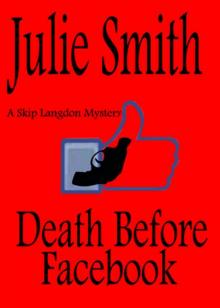 Death Before Facebook (Skip Langdon #4) (Skip Langdon Mystery) (The Skip Langdon Series)
Death Before Facebook (Skip Langdon #4) (Skip Langdon Mystery) (The Skip Langdon Series) P.I. On A Hot Tin Roof
P.I. On A Hot Tin Roof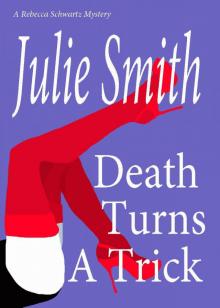 Death Turns A Trick (Rebecca Schwartz #1) (A Rebecca Schwartz Mystery) (The Rebecca Schwartz Series)
Death Turns A Trick (Rebecca Schwartz #1) (A Rebecca Schwartz Mystery) (The Rebecca Schwartz Series) The Axeman's Jazz (Skip Langdon Mystery Series #2) (The Skip Langdon Series)
The Axeman's Jazz (Skip Langdon Mystery Series #2) (The Skip Langdon Series) The Kindness of Strangers (Skip Langdon Mystery #6) (The Skip Langdon Series)
The Kindness of Strangers (Skip Langdon Mystery #6) (The Skip Langdon Series) Louisiana Hotshot
Louisiana Hotshot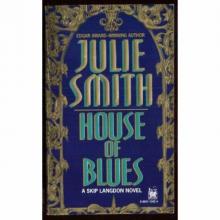 House of Blues
House of Blues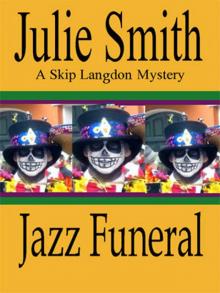 Jazz Funeral (Skip Langdon #3) (Skip Langdon Mystery) (The Skip Langdon Series)
Jazz Funeral (Skip Langdon #3) (Skip Langdon Mystery) (The Skip Langdon Series) Tourist Trap (Rebecca Schwartz #3) (A Rebecca Schwartz Mystery) (The Rebecca Schwartz Series)
Tourist Trap (Rebecca Schwartz #3) (A Rebecca Schwartz Mystery) (The Rebecca Schwartz Series) Louisiana Bigshot
Louisiana Bigshot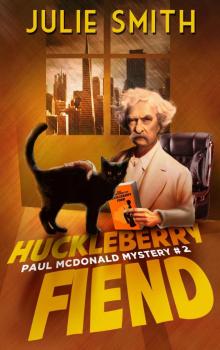 Huckleberry Fiend
Huckleberry Fiend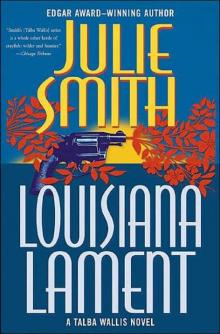 Louisiana Lament
Louisiana Lament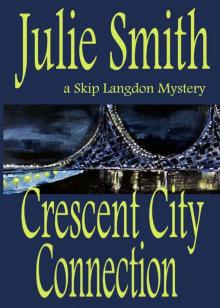 Crescent City Connection (Skip Langdon Mystery #7) (The Skip Langdon Series)
Crescent City Connection (Skip Langdon Mystery #7) (The Skip Langdon Series) Dead In The Water (Rebecca Schwartz Mystery #4) (The Rebecca Schwartz Series)
Dead In The Water (Rebecca Schwartz Mystery #4) (The Rebecca Schwartz Series) True-Life Adventure
True-Life Adventure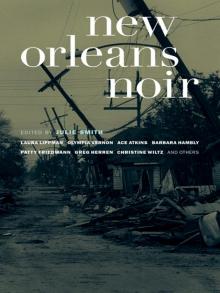 New Orleans Noir
New Orleans Noir